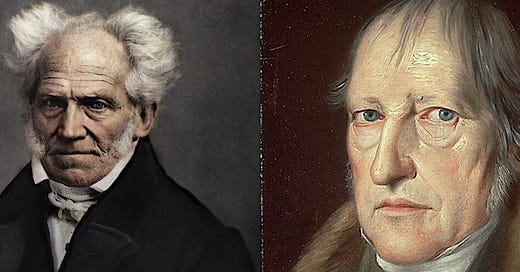The question of will is the most serious philosophical problem today. To know what future to strive to, to properly act in any given circumstance, to know what to want in general as in a specific kind of sense, is answered by the question of will, a question that was crucial for Schopenhauer and Nietzsche, Hegel and Fichte. Everything else - what comes after postmodernity or what are the stages of consciousness or what is the right political system - comes after this. And when it is true what Nietzsche said, that character is fate, then an examination of will should lead to the recognition that as well character as fate are ultimately designed by will. Everything we ever did created our character. Everything we ever wanted designed our fate.
When I ask why this question is more important than others, I start to answer with this: Because of the ethics it enables. I don´t know anybody of sane mind whose actions are not derivative of his implicit models of self and world. But to ask after postmodernity or the stages of consciousness is already the result of a particular will. Yet it is a useless question if some phenomenon is pre-, post-, or postpostmodern or not because these kinds of questions relate only to the higher symbolic functions of the interpretative mind. They are, in that sense, meaningless. On the other side, I see people becoming elated or miserable because of futures or fates they desperately desire or character traits they suffer. Meaning is something created by action, by doing, by participating in the creation of character and fate and future. If there is a valid criticism of any intellectual elegant nonsense it is that it is being void of real consequences.
That is the reason why meta-models can´t aid in the eternal question of bringing a multitude of perspectives into one single action, to elicit one certain future, to act properly in any given socio-political conflict: They have abdicated such a necessary relation. While seemingly cognitive potent they are ethically impotent. And this is the reason why proponents of these theories have no life at all. Life is created by will. The question of will therefore solves the problem of the multitudes of perspectives that breeds inaction.
To ask after will therefore implies to become ethically potent. It is no secret that societies were most creative just before and after war, sometimes even along the way, when there was an affirmation of will for good and bad. Only in phases of hightened crisis at the edge between order and chaos we are able to ask ethical questions because we were forced to rethink our modes of being.
When I ask why this question of will is more important than others, I also answer this: Because of the action it should enable. When our implicit model of will is still defined by Hegel, Schopenhauer and Fichte, the patriarchs of modernity, then our will is defined by the sum of our possible actions in the world. Here we see ourselves opposing the world as if will is the ability to shape the world according to our needs. In contrast, if our implicit model is limited by the postmodern aversion to volition, then we will have no will at all. Now we have transcendet at least in theory the dualism of self and world. We haven´t done so in practise. We still can´t act with the world. To willfully act with the world means to enter a field of resonance with the world. The subject because not longer the cause of, but the participant of will.
But we can lift ourselves up and look into the machinery of mind to understand the autopoetic desire-engine of our being. We are moving from a descriptive model of will – the question what will is and what it enables – to the prescriptive model of will – the question of what will could be and what it should enable. In contrast to Schopenhauer we can now presuppose: We can want what we want. We have elevated us, unshackled by the burdens of puritanism and Protestantism and materialist realism and postmodern aversion. Questioning the will means opening up possibilities of will, and freedoms of will. Only those who denounce the freedom of will will never experience it. That implies, we can venture into the unmarked space of designing what can be wilt, and how. Will itself can become character as it can become fate.
When I ask why this question of will is more important than others, I finally answer this: If there is a quest that is eligible to address the multitude of crisis (climate, meaning, dating, media etc) which are all consequence of the postmodern aversion to will, than the question of will becomes the most relevant one. Because it is will that creates the certain future. Only people who complain of crisis are void of will, and their aversion has become character, and this aversion will be their fate. Avoid them at all costs - T
Tom Amarque is writer, philosopher, podcast host, editor & publisher. His recent book is ‘Phenomenology of will’. He founded the German publishing house Phaenomen-Verlag in 2009 and Parallax-Media in 2019. Tom currently lives in Palma, Spain. Contact him a tomamarque@yahoo.de
.




Weak thinking, grammatical and spelling errors, uncritical… Unfollowed